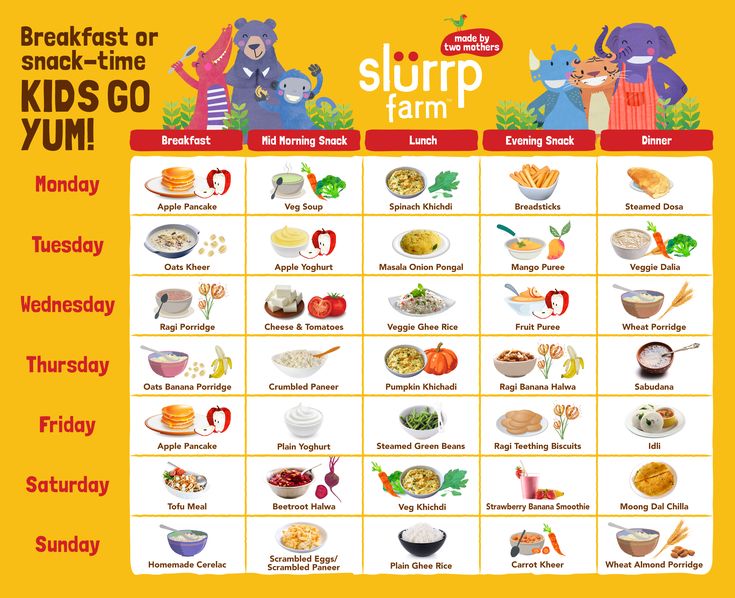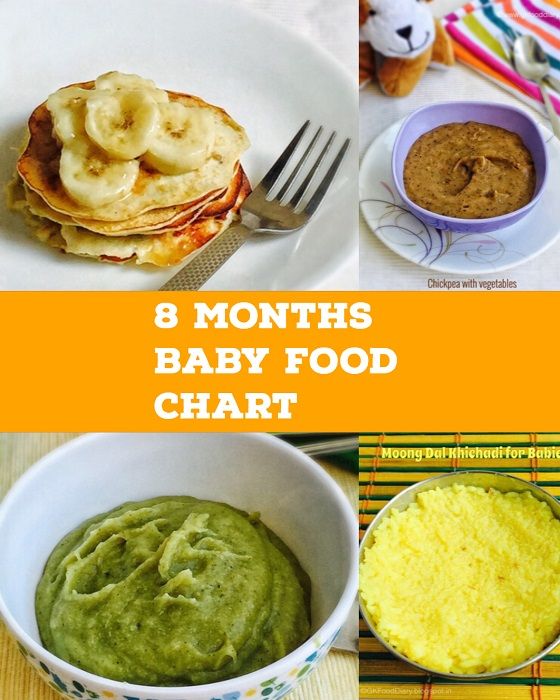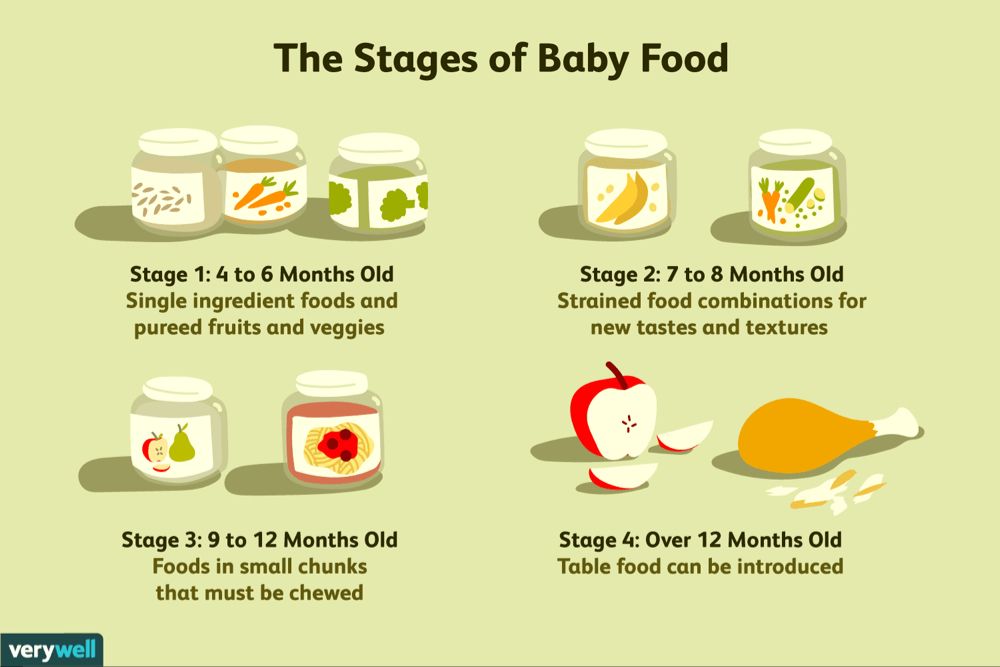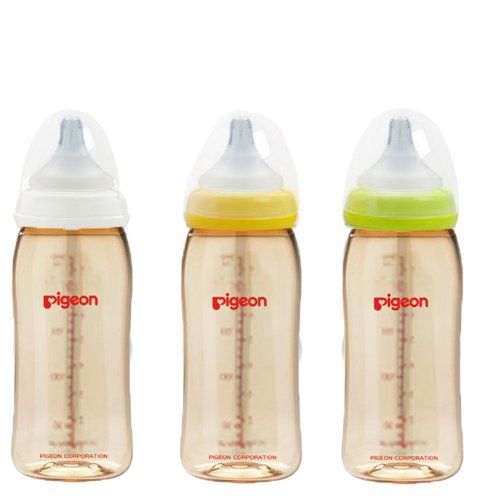8Th month baby food chart
Meal Plan For an 8-Month-Old Baby: Feeding Schedule and Tips
What are the best foods for an 8-month-old baby?
A wholesome and healthy diet that contains the correct quantity of protein, carbohydrates, minerals, and vitamins is crucial for the growth of your baby. A correct mix of all these nutrients is found in a wide variety of food items.
A menu for an 8-month-old baby should include the following foods:
- Fruits — Fresh fruits form a vital source of a wide variety of minerals, vitamins, and other types of micronutrients. Fruits cut into cubes and cooked until soft make excellent finger foods for babies of this age. Please remember to use fruits that grow in your region or at least are very widespread. That will help lower the risk of an allergic reaction.
- Vegetables — At this age, your baby may shift from eating mashed vegetables to chewing small pieces of steamed vegetables. Soft cooked vegetables also make excellent finger foods for babies.
As with fruits, to reduce the chance of an allergic reaction, don’t try anything exotic.
- Fish — You can also introduce fish to an eight-month-old baby. Fish such as salmon and tuna is a rich source of omega-3 fatty acids and is excellent for the development of the brain and growth of babies. You can offer fish as a soup or as a puree to your baby.
- Dairy — Yogurt and cheese made from pasteurized milk are excellent sources of calcium for eight-month-old babies. You can include cottage cheese, cheddar, jack, and colby cheese. Soft cheeses including blue cheese and brie can pose a health risk, so hold off on these for now.
- Protein — You can include various foods that are rich in protein for an eight-month-old’s diet. Some protein-rich foods include legumes, beans, beef, egg yolks, chicken, fish, tofu, turkey, and pork. You can cook these foods and puree them or chop them into small pieces.
- Cereals and grains — You can mix together some of the cereals that your eight-month-old baby is already eating without producing a reaction.
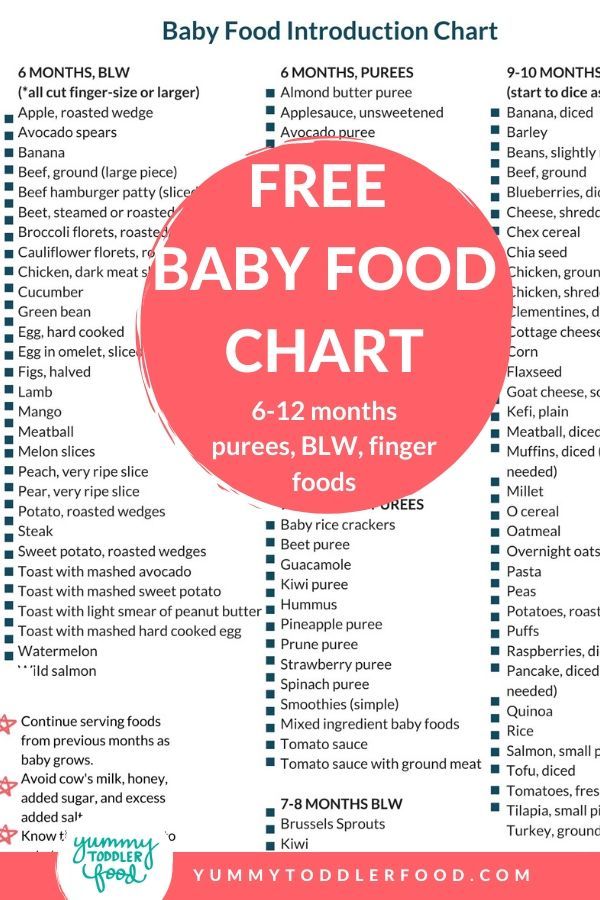 You can also introduce muffins and bread into the meal plan for your eight-month-old after your baby is able to enjoy foods with more texture. Pasta mixed with cheese is a popular favorite for babies of this age. The seeds and grains that you can include in your eight-month-old’s menu are amaranth, quinoa, rice, oats, wheat, sesame, spelt, barley, buckwheat, and millet.
You can also introduce muffins and bread into the meal plan for your eight-month-old after your baby is able to enjoy foods with more texture. Pasta mixed with cheese is a popular favorite for babies of this age. The seeds and grains that you can include in your eight-month-old’s menu are amaranth, quinoa, rice, oats, wheat, sesame, spelt, barley, buckwheat, and millet.
Take a quiz
Find out what you can do with our Health Assistant
8-month-olds feeding schedule
Making a feeding schedule for your eight-month-old baby is very personal. You will get familiar with your child’s cues gradually and can start to develop a schedule of sleeping, playing, and eating that meets the needs of your whole family. While creating an 8-month-old’s feeding schedule, remember that most babies this age need the following:
- Solid foods at least twice or three times a day along with 25 to 32 ounces of formula or breast milk every 24 hours. You can start increasing the quantity and variety of the foods in your 8-month-old baby’s diet.
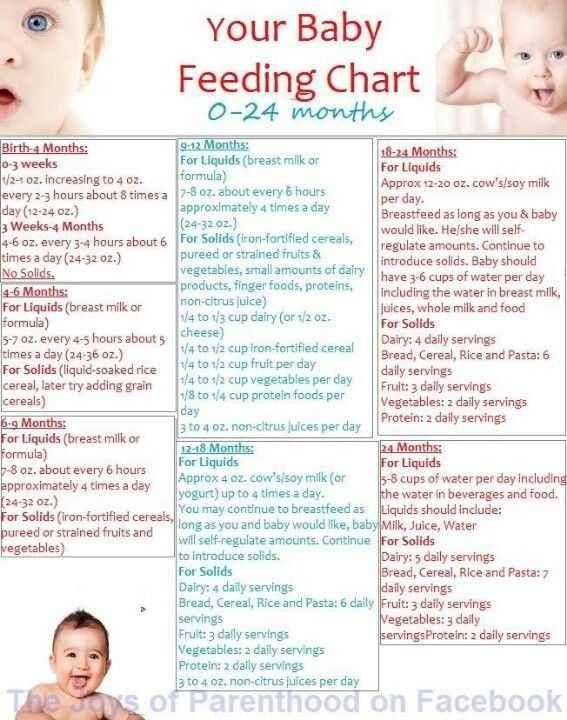 You can also try introducing a sippy cup and finger foods.
You can also try introducing a sippy cup and finger foods. - About 13 to 14 hours of sleep every 24 hours (including naps and overnight). Babies at this age often take two naps during the day — one in the morning and the other in the afternoon.
- Social interaction with their primary caregivers lets children play and work on developing new skills.
Sample meal plan for an 8-month-old
Preparing an 8-month-old’s meal plan may become more challenging as your child begins eating solid foods.
A sample meal plan for an eight-month-old baby is as follows:
Breakfast
- Mashed egg or cereal: ¼ to ½ cup
- Diced fruit: ¼ to ½ cup
- Breast milk or formula: 4 to 6 ounces
Snack
- Breast milk, formula, or water: 4 to 6 ounces
- Cooked vegetables or diced cheese: ¼ cup
Lunch
- Meat, cottage cheese, or yogurt: ¼ to ½ cup
- Orange or yellow vegetables: ¼ to ½ cup
- Breast milk or formula: 4 to 6 ounces
Snack
- One whole-grain cracker or teething biscuit
- Diced fruit or yogurt: ¼ cup
Dinner
- Diced tofu or meat: ¼ cup
- Green vegetables: ¼ to ½ cup
- Potato, rice, pasta, or noodles: ¼ cup
- Fruit: ¼ cup
- Breast milk or formula: 4 to 6 ounces
Before bedtime
- Water, breast milk, or formula: 6 to 8 ounces (if you are giving your child breast milk or formula before bed, it’s a good idea to also give them water afterwards)
Eight feeding tips for an 8-month-old baby
Here are few tips to keep in mind while feeding your 8-month-old baby.
1. Don’t forget the breast milk or formula
At eight months, your child needs about 750 to 900 calories per day, from which 400 to 500 calories should come from formula or breast milk (approximately 720 ml or 24 ounces per day). They no longer need the calories from breastfeeding or formula once they turn one.
2. Stick to one feeding position and location
While feeding your baby, it’s best to try to stick to one feeding position and location. This helps develop a strong relationship between the place and the food. High chairs not only make mealtimes trouble free, but they are also excellent at teaching your child how to sit still while eating. They also help minimize choking hazards and keep food mess more or less isolated.
3. Don’t mash the food completely
Another thing to keep in mind while preparing food for an eight-month-old baby is not to mash the food completely. Instead keep the consistency somewhat grainy. This can help your baby transition from pureed foods to solid foods more easily.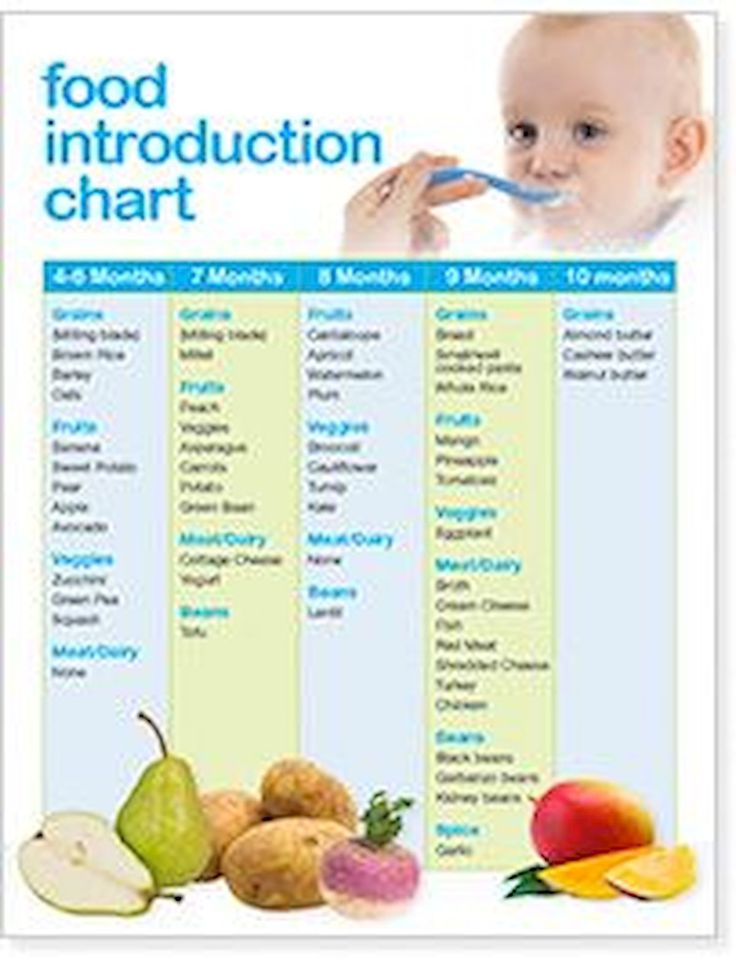
4. Don’t add salt or sugar yet
Salt and sugar can put unnecessary load on babies’ kidneys. Furthermore, eating too much salt during childhood has been shown to lead to higher risks of diseases such as hypertension, kidney disease, osteoporosis, and cardiovascular diseases later in life. Similarly, adding sugar to your baby’s diet can lead to tooth decay and cavities. Excessive sugar intake may also suppress immunity and make children more prone to developing diabetes, obesity, and cardiovascular diseases in adulthood.
5. Try to avoid plastic
If possible, store foods for your baby in containers made of glass or steel. Plastic sometimes contains harmful chemicals that can contaminate the food.
6. Avoid fried foods
Swap fried foods for steamed vegetables and fruits.
7. Be careful about allergies
When you are introducing new foods into an 8-month-old’s meal plan, make sure to introduce them one at a time, by themselves. This will help you identify any food allergies.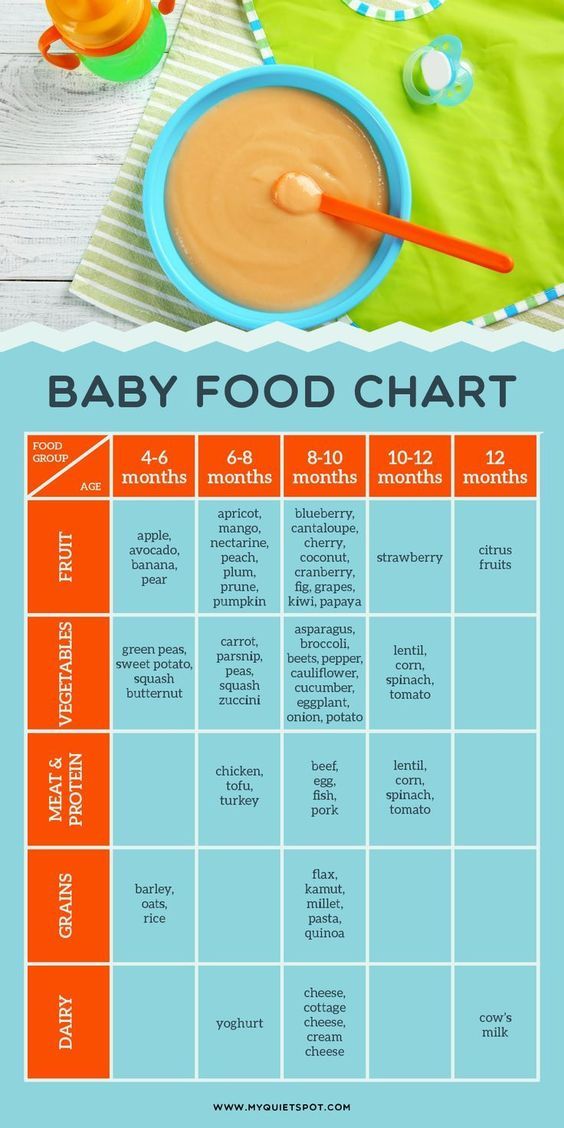 Health experts recommend that you wait at least four days between introducing new foods.
Health experts recommend that you wait at least four days between introducing new foods.
As you introduce new foods, look for possible allergic reactions such as hives, difficulty breathing, or rashes. If there is a family history of food allergies, particularly for eggs, nuts, and dairy products, exercise extra caution.
8. Don’t use cow milk yet
Cow milk doesn’t contain the essential nutrition that your baby needs at this age, so wait until they turn one before introducing it. Cow milk contains more salt, protein, calcium, and potassium than formula or breast milk. This can raise the load on babies’ kidneys.
By eight months, your baby is probably able to easily swallow mashed foods and beginning to chew soft and cooked solid foods. However, they’re still getting at least half their calories from formula or breast milk. The best foods for an eight-month-old baby are fruits, vegetables, fish, dairy, chicken, eggs, cereals, and grains.
Try to arrange the feeding schedule of your eight-month-old baby according to their personal needs and those of your family.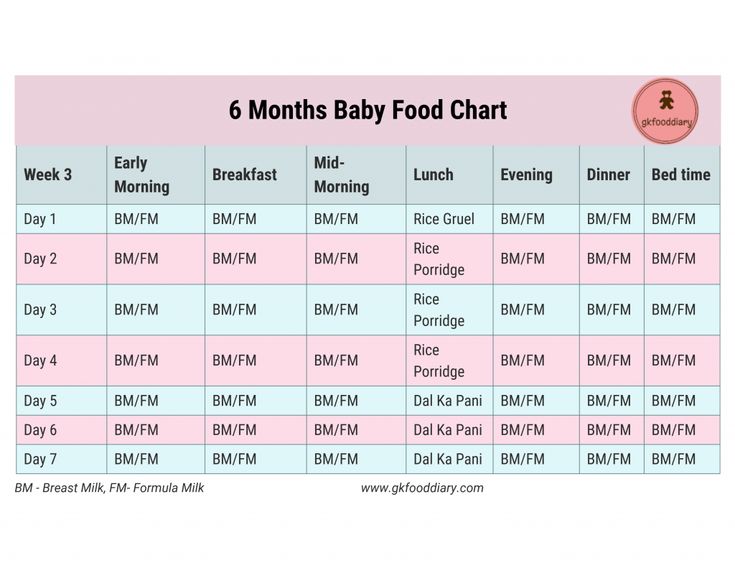 While preparing an 8-month-old baby’s meal, don’t mash the food completely. Avoid salt and sugar, and try to store leftovers in glass or steel. Be careful about food allergies, and don’t introduce cow milk until your child is one year old.
While preparing an 8-month-old baby’s meal, don’t mash the food completely. Avoid salt and sugar, and try to store leftovers in glass or steel. Be careful about food allergies, and don’t introduce cow milk until your child is one year old.
8 Months Old Baby Food Chart Along With Recipes
Your eight-month-old baby is at a stage where he is curious about everything. With a tooth or two, your baby must be grinning its way to becoming a toddler. By eight months of age, babies master the art of gulping down mashed food and slowly they even start chewing on the solid foods. Your baby is in growing stage right now, hence you will have to make sure that the foods you give him help develop his chewing skills as well as meet his dietary requirements. Read this article to find out what foods you should include in your eight-month-old baby’s diet.
Video: Food Ideas for 8 Month Old Baby
Food Ideas for an Eight-Month-Old Baby
Also Read: 8 Months Old Baby Milestones
A wholesome diet that comprises of foods rich in carbohydrates, protein, vitamins, and minerals is essential for a growing eight-month-old baby.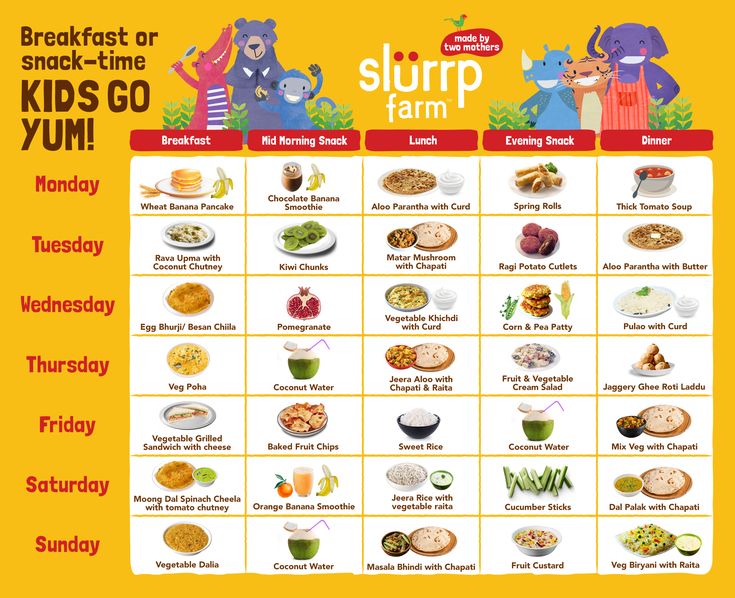 There are many natural food substances that offer a right mix of these nutrients. Typically, food for an 8-month-old baby should include one or more of the following.
There are many natural food substances that offer a right mix of these nutrients. Typically, food for an 8-month-old baby should include one or more of the following.
1. Fruits
Fruits are an excellent source of vitamins, minerals, and other micro nutrients. Apart from the regular fruits like apples, bananas, papayas, chikoo, etc., you can also include some fruits like kiwi, strawberries, pomegranates, etc. Fruits that are cut in the shape of long cubes make for excellent finger foods for babies. So, cut the fruits in different shapes and give them to your child.
2. Vegetables
At eight months of age, your baby can start making a switch from mashed vegetable puree to small cubes of steamed vegetables. You can incorporate a variety of vegetables into your baby’s diet. Add the veggies to khichdi or make a steamed vegetable bowl. You can slowly introduce vegetables like cauliflower, broccoli, asparagus, green peas, and pumpkin can be slowly introduced into his diet.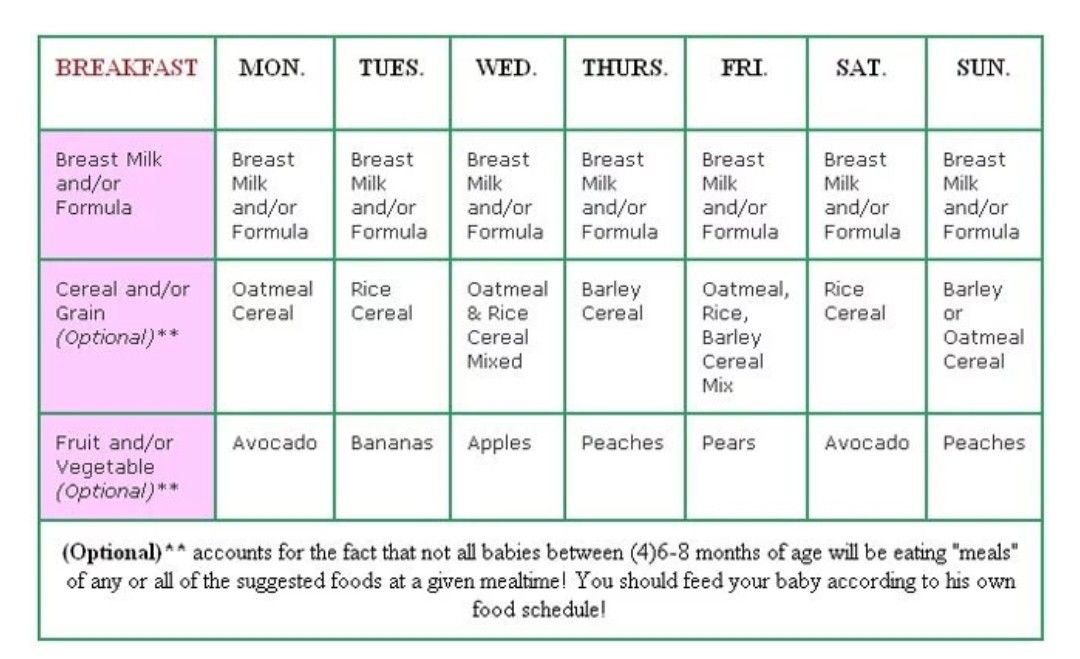
3. Fish
Fish is a very nutritious food that can be given to babies as young as eight months. Fish like tuna, salmon, rohu, etc., that are rich in omega-3 fatty acids are very good for the growth and brain development of babies. Fish can be given to babies in the form of puree or as soup.
4. Tofu/Paneer
Tofu or paneer is made out of soy milk and cow’s milk respectively. They are rich in protein and very good for developing babies. Tofu can be given to babies who are lactose-intolerant or are allergic to paneer.
5. Chicken
Chicken is believed to be one of the healthiest foods for babies. It can be typically started at the age of seven months and is usually given in the pureed form or as soup. The broth or the juice in which the chicken is cooked is also nutritious for babies.
6. Cheese
Cheese made out of pasteurised milk is a great source of calcium for growing babies. The processed cheese available in the market makes for a great snack for babies to munch on.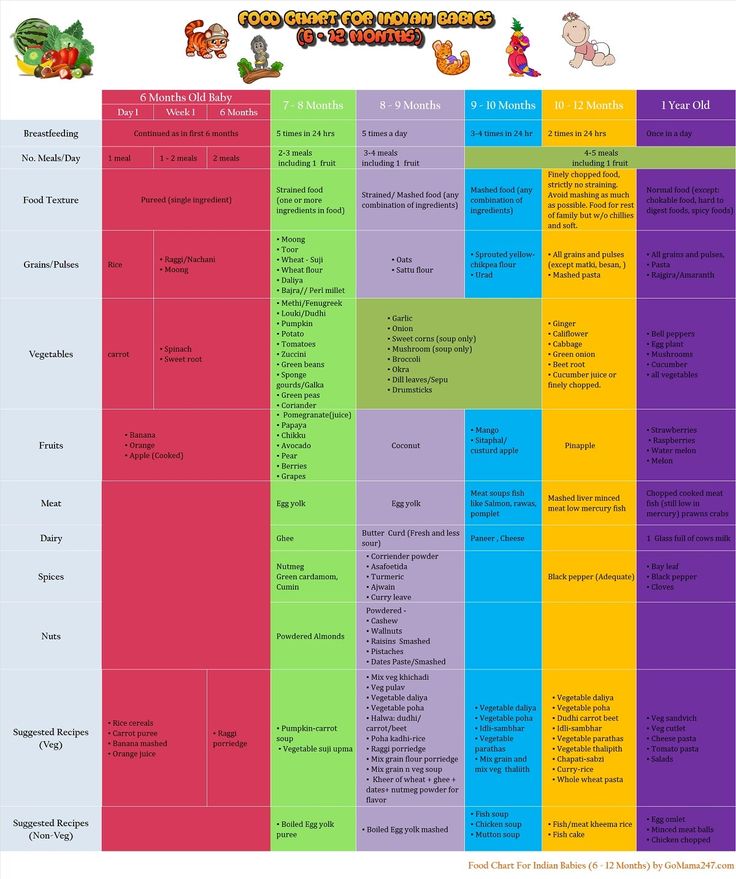 You can give cheese to your baby but, give it in limited quantities as too much of anything could result in an upset stomach.
You can give cheese to your baby but, give it in limited quantities as too much of anything could result in an upset stomach.
7. Eggs
Eggs are a wholesome food as they contain good fats and healthy proteins. You can give a boiled egg to your baby in bite-sized pieces. Some babies are allergic to eggs, so you must watch out for any warning signs of allergy in babies.
8. Yoghurt
Thick yoghurt made from cow’s milk can be given to babies, especially in summers. There are many fruit flavored yoghurt available in the market that make for excellent snack options for babies. They not only provide good bacteria for the gut but also serve as a great source of essential vitamins and minerals.
Also Read: Your 8 Months Old Baby Growth and Development
How Much Food Should a Baby Eat at This Stage?
Most often eight-month-old babies feed actively but sometimes they may throw tantrums while eating and get distracted away from food due to their new-found mobility. Babies who start crawling by this age, usually feed on the go as they show more interest in exploring the things around them. A typical eight-month-old baby should have three solid meals and two snacks along with at least two sessions of breastfeeding or formula feeding.
Babies who start crawling by this age, usually feed on the go as they show more interest in exploring the things around them. A typical eight-month-old baby should have three solid meals and two snacks along with at least two sessions of breastfeeding or formula feeding.
Food Schedule
Here is a sample food schedule for an eight-month-old baby.
- Morning- Wake up and nurse for a few minutes (about 200 ml)
- Breakfast – 1 cup of pureed veggies or anything else in breakfast
- Mid-morning Snack – Half a cup of fruit/yoghurt/boiled vegetables
- Lunch- 1 cup of cereal
- Nap time
- Evening Snack – Breast milk or formula milk (about 200ml)
- Dinner – 1 cup of porridge/pureed veggies/cereal
- Night – Breastfeed before putting him to bed
Also Read: Toys for 8 Months Old Baby
Video: Diet Plan for a 8 Month Old Baby
A Sample Food Chart/Meal Plan for an Eight-month-old Baby
Here is a sample chart that you can use as a guideline for your eight-month-old baby.
Diet for a 8 Month-Old – Week 1, Day 1
| Early morning | Mother’s milk /formula feed |
| Breakfast | Idli with a little ghee or butter |
| Mid-morning | Mother’s milk /formula feed |
| Lunch | Rice-carrot porridge |
| Evening | Mother’s milk /formula feed |
| Dinner |
Diet for a 8 Month-Old – Week 1, Day 2
| Early morning | Mother’s milk /formula feed |
| Breakfast | Idli with a little ghee or butter |
| Mid-morning | Mother’s milk /formula feed |
| Lunch | Carrot-beetroot soup |
| Evening | Mother’s milk /formula feed |
| Dinner | Ragi (finger millet) – wheat sheera |
Diet for a 8 Month-Old – Week 1, Day 3
| Early morning | Mother’s milk /formula feed |
| Breakfast | Idli with a little ghee or butter |
| Mid-morning | Mother’s milk /formula feed |
| Lunch | Idli with a little ghee or butter |
| Evening | Mother’s milk /formula feed |
| Dinner | Roti dipped in dal |
Diet for a 8 Month-Old – Week 1, Day 4
Diet for a 8 Month-Old – Week 1, Day 5
Diet for a 8 Month-Old – Week 1, Day 6
| Early morning | Mother’s milk /formula feed |
| Breakfast | |
| Mid-morning | Mother’s milk /formula feed |
| Lunch | Ragi (finger millet) – wheat sheera |
| Evening | Mother’s milk /formula feed |
| Dinner | Bajra (pearl millet) – moong dal (green gram split) khichdi |
Diet for a 8 Month-Old – Week 1, Day 7
Diet for a 8 Month-Old – Week 2, Day 1
Diet for a 8 Month-Old – Week 2, Day 2
Diet for a 8 Month-Old – Week 2, Day 3
| Early morning | Mother’s milk /formula feed |
| Breakfast | |
| Mid-morning | Mother’s milk /formula feed |
| Lunch | Spinach-pumpkin puree |
| Evening | Mother’s milk /formula feed |
| Dinner | Ragi (finger millet) – wheat sheera |
Diet for a 8 Month-Old – Week 2, Day 4
Diet for a 8 Month-Old – Week 2, Day 5
Diet for a 8 Month-Old – Week 2, Day 6
Diet for a 8 Month-Old – Week 2, Day 7
Diet for a 8 Month-Old – Week 3, Day 1
| Early morning | Mother’s milk /formula feed |
| Breakfast | |
| Mid-morning | Mother’s milk /formula feed |
| Lunch | Wheat sheera (soft) |
| Evening | Mother’s milk /formula feed |
| Dinner | Bajra (pearl millet) – moong dal (green gram split) khichdi |
Diet for a 8 Month-Old – Week 3, Day 2
Diet for a 8 Month-Old – Week 3, Day 3
Diet for a 8 Month-Old – Week 3, Day 4
Diet for a 8 Month-Old – Week 3, Day 5
Diet for a 8 Month-Old – Week 3, Day 6
| Early morning | Mother’s milk /formula feed |
| Breakfast | Mashed papaya |
| Mid-morning | Mother’s milk /formula feed |
| Lunch | Idli with a little ghee or butter |
| Evening | Mother’s milk /formula feed |
| Dinner | Lentil- sweet potato soup |
Diet for a 8 Month-Old – Week 3, Day 7
| Early morning | Mother’s milk /formula feed |
| Breakfast | Mashed papaya |
| Mid-morning | Mother’s milk /formula feed |
| Lunch | Ragi (finger millet) – wheat sheera |
| Evening | Mother’s milk /formula feed |
| Dinner | Carrot-beetroot soup |
Diet for a 8 Month-Old – Week 4, Day 1
Diet for a 8 Month-Old – Week 4, Day 2
Diet for a 8 Month-Old – Week 4, Day 3
Diet for a 8 Month-Old – Week 4, Day 4
| Early morning | Mother’s milk /formula feed |
| Breakfast | |
| Mid-morning | Mother’s milk /formula feed |
| Lunch | |
| Evening | Mother’s milk /formula feed |
| Dinner | Roti dipped in dal |
Diet for a 8 Month-Old – Week 4, Day 5
| Early morning | Mother’s milk /formula feed |
| Breakfast | |
| Mid-morning | Mother’s milk /formula feed |
| Lunch | |
| Evening | Mother’s milk /formula feed |
| Dinner | Ragi (finger millet) – wheat sheera |
Diet for a 8 Month-Old – Week 4, Day 6
Diet for a 8 Month-Old – Week 4, Day 7
Video: 8 Month Baby Food Recipes
Food Recipes for an 8-month-old Baby
Apart from the regular pureed foods that your baby is now used to having, you can try some of these new recipes to tickle your baby’s taste buds. Here are some interesting Indian homemade baby food recipes for an 8-month-old:
1. Broccoli Soup Recipe
Broccoli is nutritious and tastes delicious too. Here is how you can make broccoli soup for your baby.
Ingredients
- Butter -1 teaspoon
- Broccoli florets – 1 cup
- Pepper powder – A pinch
- A pinch of salt
How to prepare
- Add the butter in a pan and allow it to melt.
- Add broccoli florets to it and sauté for a few minutes.
- Cover the pan with a lid and allow it to cook.
- Once the broccoli cools, blend it to make a fine paste in a blender.
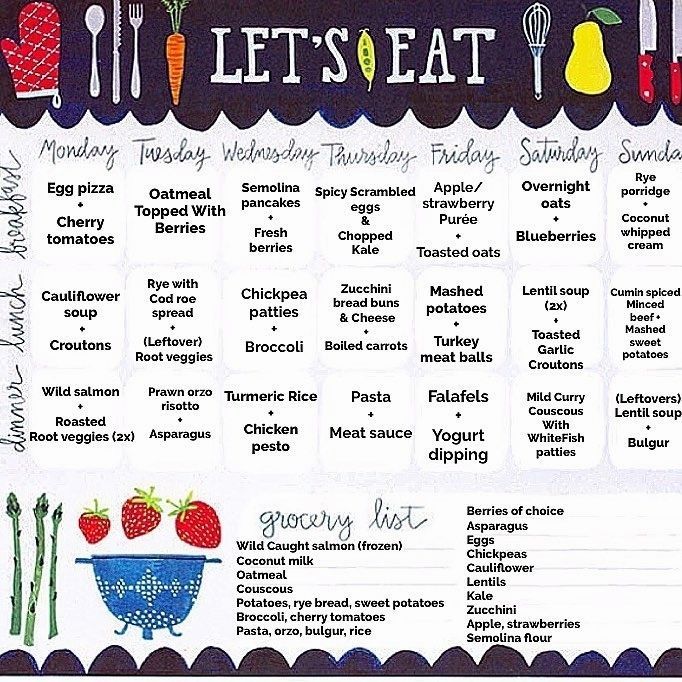
- In another pan, add some butter and add the broccoli paste to it. Allow it to cook and add the salt and pepper powder to it. Feed the baby once it cools down.
2. Fish Puree Recipe
If you love eating fish, your little one will like it too. Learn the recipe of fish puree. It’s easy-to-make and tastes delicious!
Ingredients
- Cleaned and prepared fish
- Water – 1 cup
How to prepare
- Boil the water in a vessel.
- In a small vessel take the chopped fish and place this vessel inside the vessel containing water.
- Allow it to cook. The colour of the fish should change to white once it cooks completely.
- Grind the cooked fish to puree and add the salt and jeera powder to taste.
3. Apple Ragi Porridge Recipe
Ragi, also known as finger millet or nachni is high in proteins, calcium, and iron. It also helps a baby gain weight and you know apples are always good.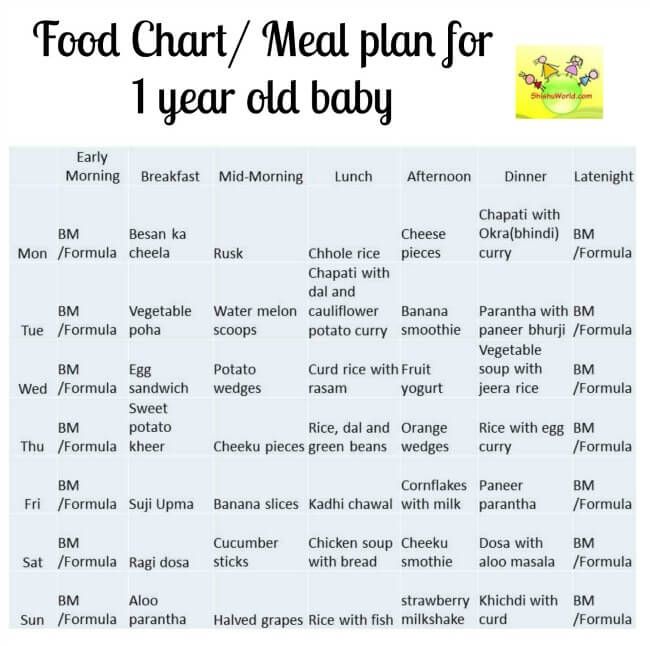 So include ragi in your baby’s diet by making yummy apple and ragi porridge!
So include ragi in your baby’s diet by making yummy apple and ragi porridge!
Ingredients
- Grated apple – 1 cup
- Ragi flour – 1 tablespoon
- Ghee – 1/2 teaspoon
- Water – 1.5 cups
How to prepare
- Take the ragi flour in a bowl and slowly add the water to it. Mix it well making sure that no lumps are formed.
- Heat some ghee in a pan and add the ragi mixture to it.
- Stir continuously till you see the bubbles forming.
- At this stage, add the grated apple pieces to the porridge.
- Allow the apple pieces and ragi to cook well. If the porridge turns thick, dilute it with water and bring it to the required consistency.
- Once it is cooked, turn off the flame and add a drop of ghee before giving it to your child.
4. Suji Upma Recipe
Upma is a healthy breakfast and is enjoyed by both adults and kids. So how about introducing this tasty breakfast to your child? Learn the recipe here –
Ingredients
- Suji – 1/2 cup
- Finely chopped veggies (of your choice) – 1 cup
- Curry leaves – 5-6
- Ghee -1 teaspoon
- Mustard seeds – 1/2 teaspoon
- Water- 2 cups
- Salt- 1/4 teaspoon
How to prepare
- Heat one tablespoon of ghee in a pan and roast the suji until it turns brown.
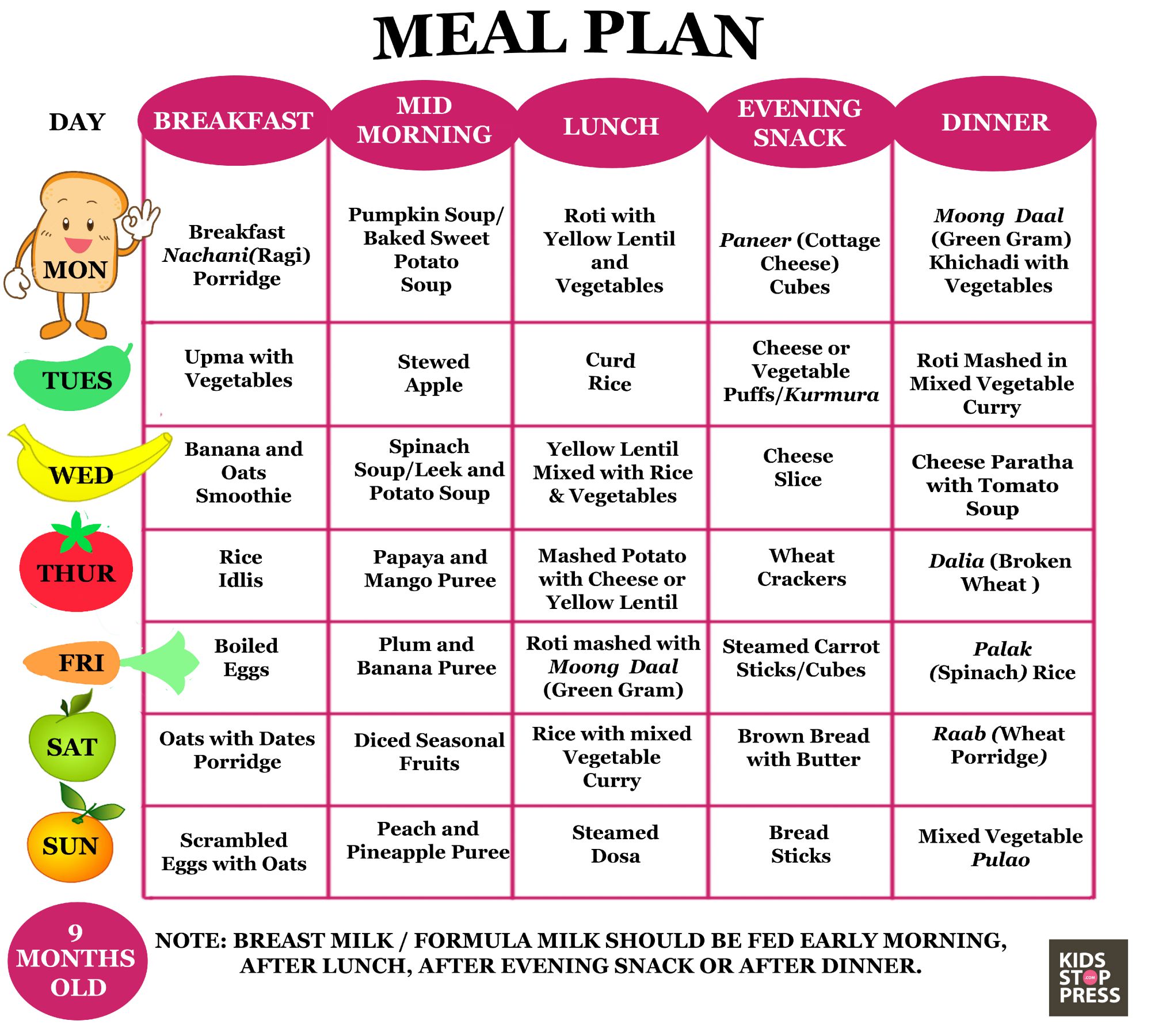 Once done, transfer it to a large dish and keep aside.
Once done, transfer it to a large dish and keep aside. - Next, heat some ghee in the pan and add the mustard seeds to it.
- Once the mustard seeds splutter, add a cup of vegetable and cover it with a lid, allowing the vegetables to cook.
- Then add 2 cups of water and salt to taste.
- When the water comes to a boil, add the suji and stir continuously to make sure no lumps are formed.
- Cover the pan with a lid for some time. Add a teaspoon of ghee then switch off the flame. Feed once it cools a bit.
5. Carrot Wedges Recipe
Carrots are nutritious and are very good for the eyes. Carrot wedges are a perfect finger food which you can give to your little one as a snack. Here’s how you can make carrot wedges.
Ingredients
- Carrots (cut into wedges) – 1 cup
- A pinch of salt
- Pepper powder – A pinch
- Ghee – 1 teaspoon
How to prepare
- Boil the water in a pan and when it comes to a boil, add the carrot pieces.
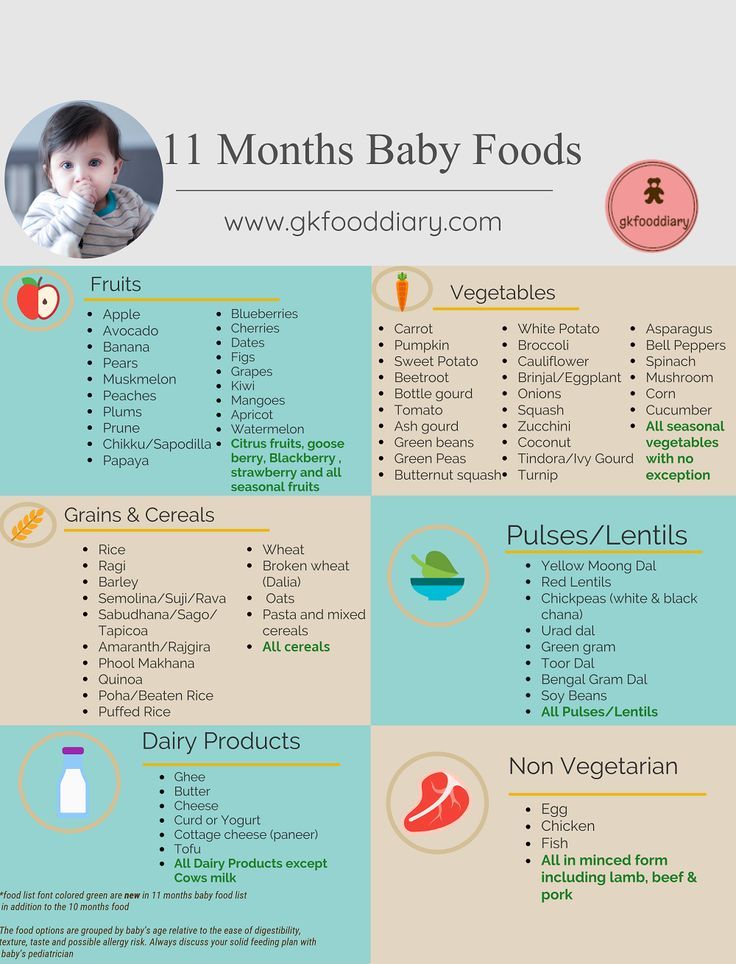
- Allow it to cook to a biting consistency. Then turn off the flame.
- Heat the ghee in a pan, add the carrot pieces to it, and sauté for 2-3 minutes.
- Add the salt and pepper powder and mix well.
- Switch off the flame and allow it cool. Once it cools, give it to your baby.
Feeding Tips
Keep these tips in mind while feeding your 8-month-old baby:
- Remember that breast milk or formula milk should remain the primary source of nutrition for an eight-month-old baby. Besides starting with solid food, doctors recommend one or two sessions of feeding for babies up to one year of age.
- Avoid giving cow’s milk to your baby, until he turns one.
- If there is a history of any food allergy in the family, especially for dairy products, watch out for the signs of allergy in your baby. Also, speak to your doctor about the possibilities of your child inheriting such allergies.
- Avoid giving deep fried foods to your little one.
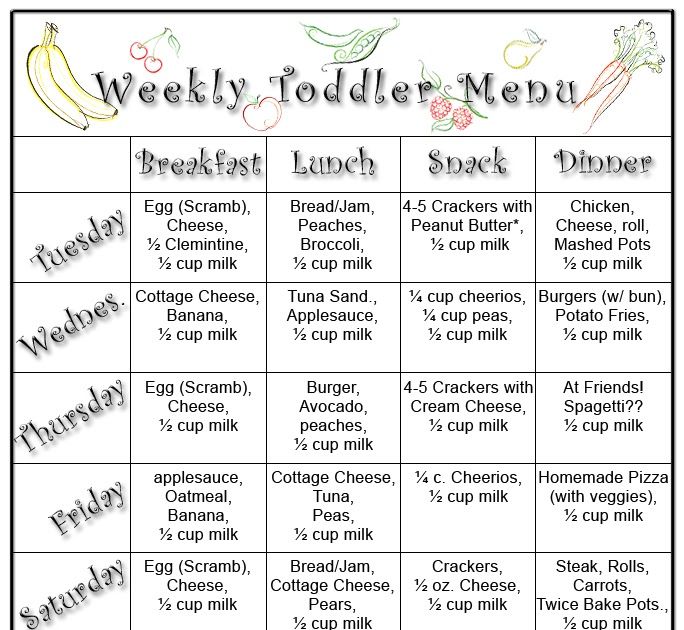 Try to incorporate steamed fruits and vegetables in his diet.
Try to incorporate steamed fruits and vegetables in his diet. - Always feed the baby in a particular position and location every day. This develops a strong connection in their mind between food and the place where they are being fed. For example, if you make your baby sit on a high chair to feed him solids, he will associate it with food.
- Keep the consistency of the food a little grainy and do not mash it completely. It will help your eight-month-old baby to transition from mashed to solid foods.
- Avoid adding salt and sugar in food if your baby is below one year of age. Many doctors advice against the use of both, as it puts unnecessary stress on the kidneys.
- Eight-month-old babies usually get easily distracted while feeding, as they develop mobility and are curious about things around them. When your baby refuses to eat anything, try to feed in small quantities at different times.
- Babies tend to gag or choke while nibbling on finger food. They may also accidentally bite a large chunk of food.
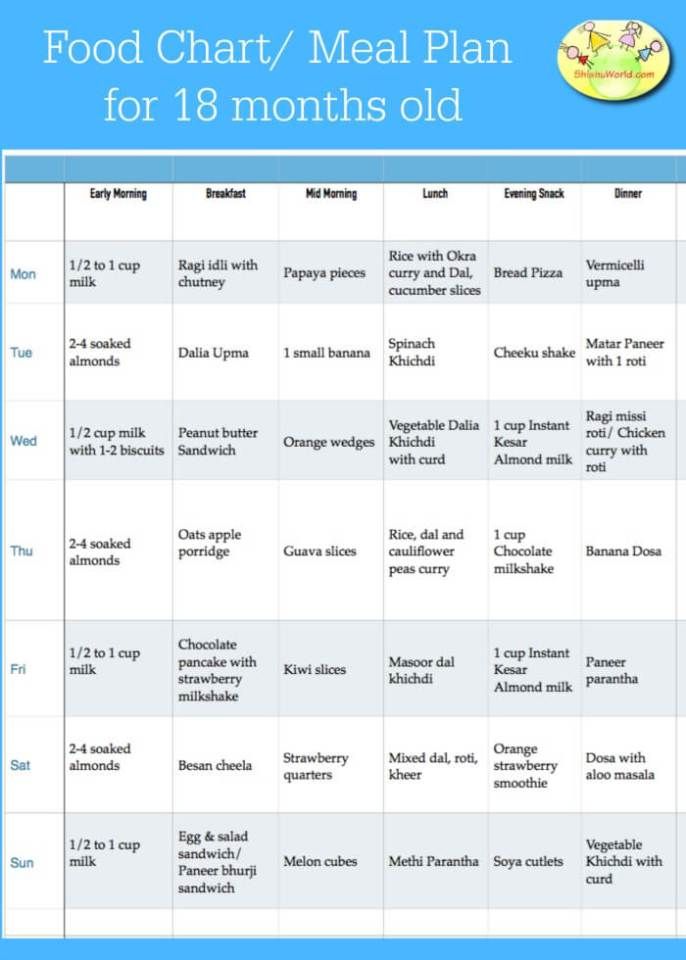 Parental attention is very important while your baby is chewing on solids.
Parental attention is very important while your baby is chewing on solids. - Prepare and store baby foods in steel or glassware. Avoid the use of plastic as it contains harmful chemicals that have a likelihood of entering the food.
At eight months of age, babies move around quite a lot and spend a lot of their time and energy in exploring the things around them. To make sure that your baby stays active and doesn’t get exhausted, you must ensure that he eats healthy food. So plan your baby’s food chart well in advance after consulting with a nutritionist. Include fresh fruits and steamed vegetables in his diet – it will provide him with the much-needed nutrition, and he will get into the habit of eating healthy foods.
Disclaimer:
- Each child is different and so use these meal plans as a trusted guide as per your discretion. You can modify the meals according to your child’s preferences / requirements.
- Never force-feed a child.
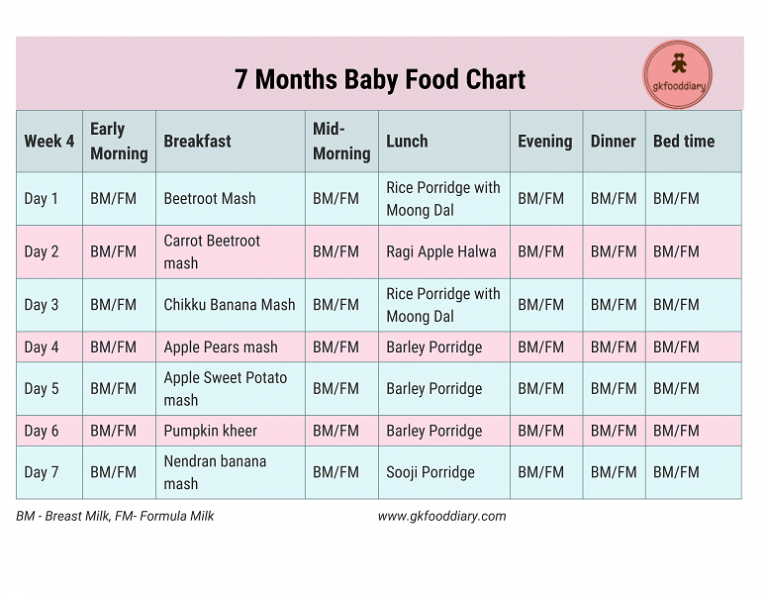
- While preparing formula, please follow the instructions on the box and use the measuring spoon provided with it.
- While introducing solid food to a baby, initially, one needs to prepare watery gruels/soups. As a child gets older, the caretaker/ mother has to increase the thickness of the liquids slowly according to the child’s capacity to swallow. Foods that are too thick can cause stomach upset/ unnecessary load; while excessively watery food might cause the child to remain hungry.
- Some kids may eat less on some days and that is absolutely alright. However, if a child eats less for more than 3-4 consecutive days, please visit a doctor to guide further.
- A child may eat less during the teething phase or if he/she may not be feeling well. You could increase breast milk /formula feeds on those days. Re-introduce the foods once the child is back to normal.
- Don’t stop feeding if the child is suffering from diarrhoea.
- You can alter the taste of the food by adding some natural flavours like cinnamon, jeera powder, lemon juice, curry leaves etc.
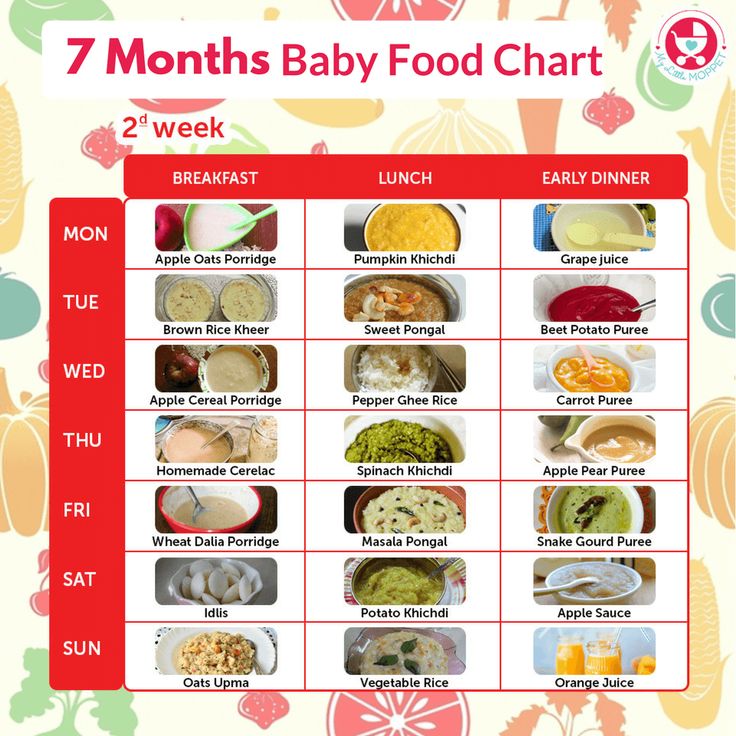 if the child doesn’t accept the food initially.
if the child doesn’t accept the food initially. - If your child suffers from an allergy to nuts, gluten or eggs, please consult your doctor before feeding him/her any foods that may contain them.
Also Read: Food Ideas for 9 Months Old Baby
Diet for an 8-month-old baby
In the ninth month, fish can be introduced into the diet of children. Along with animal meat, fish is a source of complete protein with a well-balanced composition of amino acids, fat, vitamins B2, B12 and minerals. Compared to meat, fish contains 5 times less connective tissue, due to which it is quickly boiled soft, has a delicate texture after heat treatment and is easier to digest. Fish oil is characterized by a high content of polyunsaturated fatty acids, including the ω-3 class. These substances are necessary for the child to mature the brain, retina, strengthen the cardiovascular and immune systems. Sea fish contains such important trace elements for the child's body as iodine and fluorine.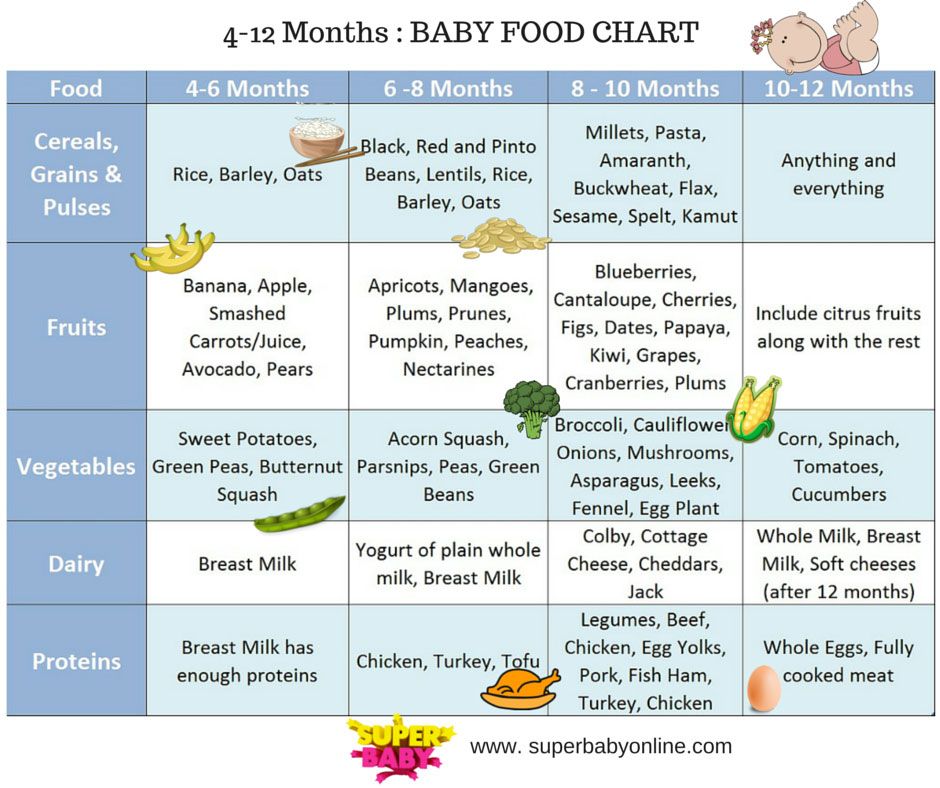 The child should be given 1-2 times a week instead of meat, be sure to monitor how the child tolerates fish in general and its individual varieties. Preference should be given to oceanic fish, preferably white (cod, hake, pollock), red salmon can be recommended, river pike perch, carp. nine0003
The child should be given 1-2 times a week instead of meat, be sure to monitor how the child tolerates fish in general and its individual varieties. Preference should be given to oceanic fish, preferably white (cod, hake, pollock), red salmon can be recommended, river pike perch, carp. nine0003
Self-cooked fish is given to a child with boiled and mashed vegetables. You can also offer your baby fish and vegetable canned food, but they contain only 10 - 20% of fish.
At this age, when all the main food groups have already been introduced, special attention should be paid to the diversity of the composition of dishes. New, possibly combined products are introduced, for example, not only purees from various fruits and berries, but also their combinations with cottage cheese, cream, cereals, etc.
From the age of 8 months, the child's diet can be expanded to include fermented milk products (baby kefir, biokefir, bifidokefir, yogurt, bioyogurt, biolact). Fermented milk products are prepared using a special starter culture that breaks down milk protein, so that the baby can get an indispensable set of amino acids in a well-available form.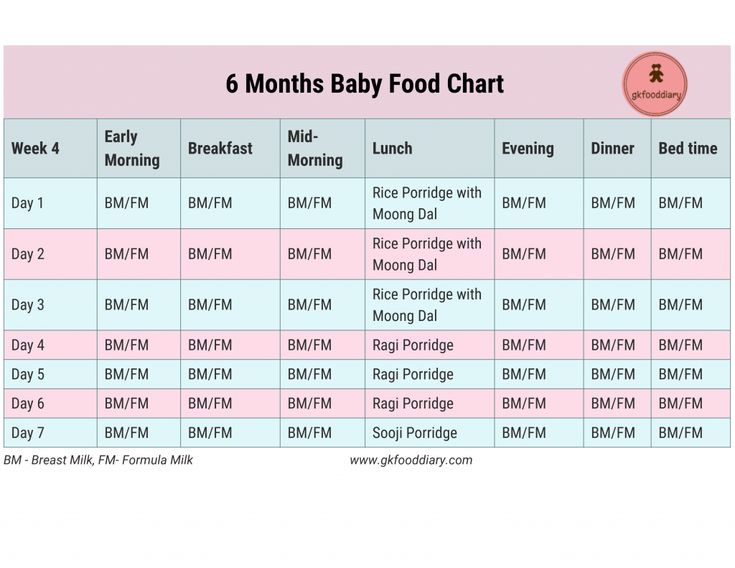 Fermented milk products improve the composition of the intestinal microflora of the child, are rich in B vitamins and calcium. Their regular use favorably affects the functioning of the intestines, stimulates appetite, and increases the absorption of micronutrients. Children's dairy products are introduced into the baby's diet gradually, starting with 1 tsp. and with good tolerance increase their volume to 150-200 ml per day. nine0003
Fermented milk products improve the composition of the intestinal microflora of the child, are rich in B vitamins and calcium. Their regular use favorably affects the functioning of the intestines, stimulates appetite, and increases the absorption of micronutrients. Children's dairy products are introduced into the baby's diet gradually, starting with 1 tsp. and with good tolerance increase their volume to 150-200 ml per day. nine0003
Sample menu for a healthy baby 8 months
| I feeding 6 hours | Breast milk or infant formula | 200 ml |
| II feeding 10 hours | Dairy-free* or milk porridge Butter Boiled egg yolk Fruit puree Fruit juice | 180 g | nine0024
| III feeding 14 hours | Vegetable puree Vegetable oil Meat puree Fruit juice | 170 g 1/2 tsp 50 g 50 ml |
| IV feeding 18 hours | Cottage cheese Baby biscuits Fruit puree Supplementation with breast milk or baby kefir/yogurt | 40 g |
| V feeding 22 hours | Breast milk or infant formula | 200 ml |
* - diluted with breast milk, infant formula or water
Approximate daily ration for an 8 month old baby allergic to cow's milk proteins
| I feeding 6 hours | Breast milk or formula for children allergic to cow's milk proteins | 200 ml |
| II feeding 10 o'clock | Dairy-free* porridge Vegetable oil Fruit puree (apple, pear) | 120 g 1 tsp 80 g |
| III feeding 14 hours | Vegetable puree Vegetable oil Meat puree | 170 g 1 tsp 40 g |
| IV feeding 18 hours | Vegetable puree or porridge Vegetable oil Meat puree | 170 g 1 tsp 30 g |
| V feeding 22 hours | Breast milk or formula for children allergic to cow's milk proteins | 200 ml |
* - diluted with breast milk or formula for children allergic to cow's milk proteins
approximate diet for a week, menu for a day with artificial and breastfeeding for an 8 month old baby
Published: 02/10/2021
Reading time: 3 min.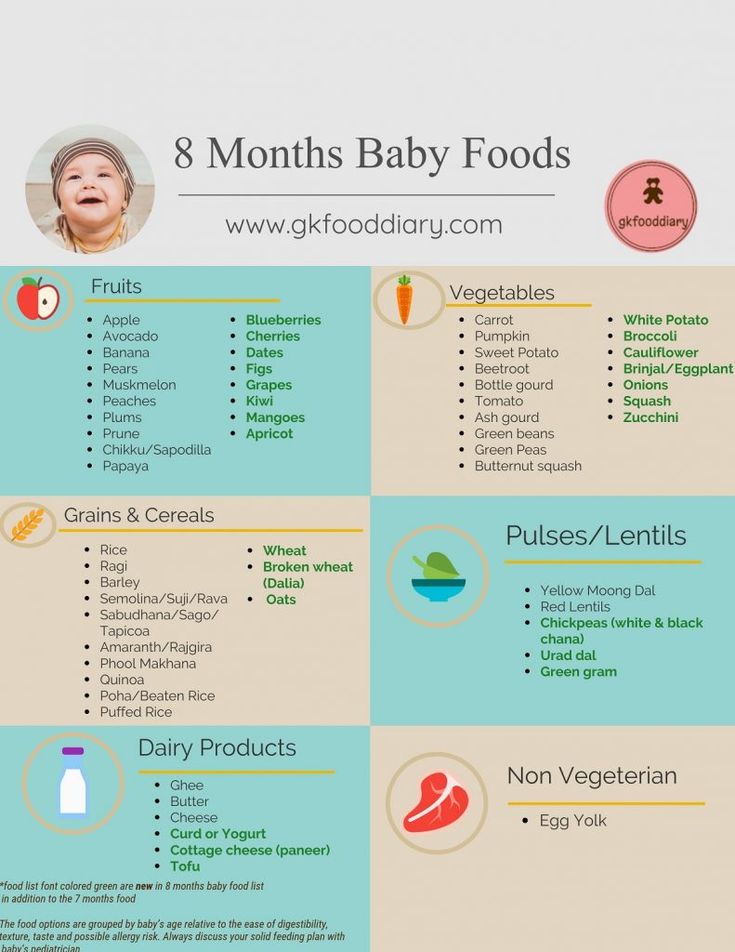
Number of reads: 89422
Author of the article: Ponomareva Yulia Vladimirovna
Pediatrician, Candidate of Medical Sciences, Allergist-Immunologist . The process of intensive growth and development continues - the baby is rapidly mastering new motor skills, improving in speech and cognitive activities. nine0003
The pace of growing up and high activity determine the clear requirements for the nutrition of the baby, which must quantitatively and qualitatively meet the needs of children at this stage of life. By the 8th month of life, the child's digestive tract is already quite mature. It is able to digest and assimilate the products of the main food groups. Let's look at the basic principles of compiling a baby's diet, and also develop a menu for 8 months, indicating an approximate list of dishes and a meal plan for a week. nine0003
Contents: Hide
- General principles
- A must in the diet
- Sample menu for a week for 8 months
General principles
It is fine if a mother continues to breastfeed at this age Breast milk is no longer the basis of the diet, but continues to be a source of easily digestible and beneficial nutrients, and also protects the baby from many infectious diseases.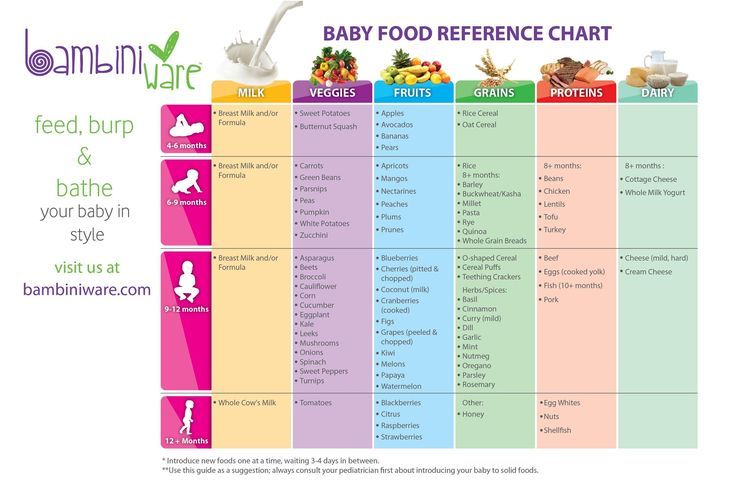 If the baby is artificially fed, use an adapted mixture in the diet that suits him well and matches his age. In addition to breastfeeding, an 8-month-old baby's eating schedule includes 4-5 meals. Of these, three are basic (breakfast, lunch and dinner), two are additional (second breakfast and afternoon tea). The baby already withstands 3.5–4 hours between meals and at least 6 hours at night. The volume of each feeding is 170–200 ml and approximately 1000 ml/g per day. nine0003
If the baby is artificially fed, use an adapted mixture in the diet that suits him well and matches his age. In addition to breastfeeding, an 8-month-old baby's eating schedule includes 4-5 meals. Of these, three are basic (breakfast, lunch and dinner), two are additional (second breakfast and afternoon tea). The baby already withstands 3.5–4 hours between meals and at least 6 hours at night. The volume of each feeding is 170–200 ml and approximately 1000 ml/g per day. nine0003
A must in the diet
Your 8-month-old baby's daily menu should include the main food groups that guarantee the supply of vital nutrients - proteins, fats and carbohydrates. What products must be included in the menu at this age? Porridge is one of the first and most important complementary foods. It is rich in all the main nutrients, provides long-lasting satiety and has a pleasant taste. By the 8th month of life, babies digest and assimilate dishes from various cereals well, therefore, multi-component cereals with natural fruit or vegetable additives, dairy-free or based on specially prepared milk can be used in nutrition.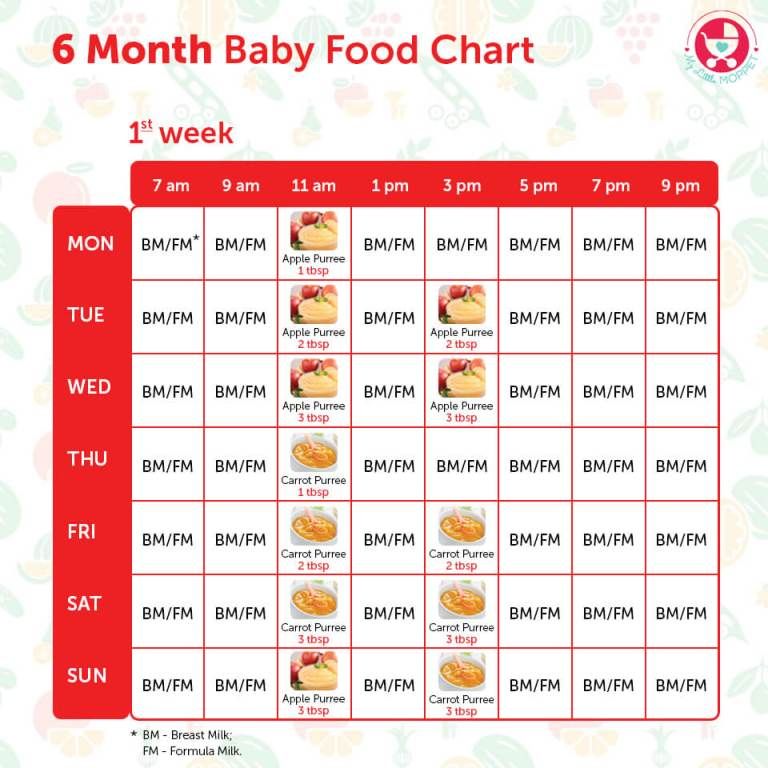 nine0003
nine0003
Vegetables and fruits do not have a high nutritional value, but are a major source of fiber. Therefore, they are also required in the daily menu. Meat complementary foods are a source of protein that is complete in terms of amino acid composition, and a baby should receive 60–80 grams of meat per day. Dairy products are another source of complete protein and easily digestible fat. However, the introduction of non-adapted dairy products can cause allergies and increase the load on the baby's kidneys. In this regard, the menu should contain no more than 50 grams of cottage cheese daily. From 8 months, fermented milk drinks for baby food can be introduced into the diet of a healthy child. nine0003
In addition to animal fats, the daily diet should include vegetable oils as a source of polyunsaturated fatty acids, which are absolutely necessary for a growing organism.
In addition to essential nutrients, a daily intake of vitamins and minerals is just as important.